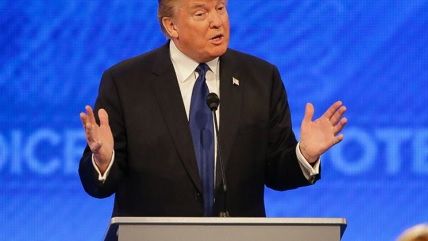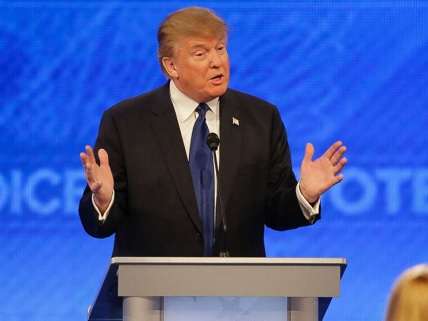Donald Trump Gives Confused Donald Trump Answer on Police
Police are mistreated, but police brutality is real and Trump will do something about it even though cops are already worried about losing their jobs.


Donald Trump was asked at the New Hampshire GOP presidential debate about his previous comments that police were the most mistreated people in America, and how he would "bridge the divide" between police and the communities they're supposed to sell. It's cute that ABC's David Muir thought he was going to get an actual answer on that from Trump.
Trump started:
Well, there is a divide, but I have to say that the police are absolutely mistreated and misunderstood, and if there is an incident, whether it's an incident done purposely—which is a horror, and you should really take very strong action—or if it is a mistake, it's on your news casts all night, all week, all month, and it never ends.
The police in this country have done an unbelievable job of keeping law and order, and they're afraid for their jobs, they're afraid of the mistreatment they get, and I'm telling you that not only, me speaking, minorities all over the country, they respect the police of this country and we have to give them more respect.
They can't act. They can't act. They're afraid for losing their pension, their job. They don't know what to do. And I deal with them all the time. We have to give great respect, far greater than we are right now, to our really fantastic police.
A lot of these assertions are meaningless (most people "respect" the police, it doesn't mean they're not concerned about brutality), dubious (cops, who are supposed to be professionals, care what people think about them), or outright false (cops are afraid of losing their jobs). Trump wasn't asked and didn't specify what kind of "incident done purposely" he considered a horror. There are so many such stories on our news casts "all night, all week, all month". It's not as simple to differentiate the incidents done "on purpose" from the "mistakes" as Trump suggests, and the complete lack of transparency and accountability—which has fueled much of the distrust of the police—makes differentiation even harder.
The idea that cops en masse are worried about losing their pension or job is ridiculous, and intellectually dishonest even for Trump. Police have among the strongest union protections in the country. Trump has seen incidents of police brutality (or "mistskes") play out on the news casts non-stop, according to him—so he ought to now very few cops are ever removed from their jobs over such incidents, and very few such incidents are widely reported or investigated in the first place.
If more cops did lose their jobs over misconduct and making "mistakes" that professionals should not be making, Trump's concern about "mistreatment" and lack of respect would solve itself. Police unions produce rules that protect bad actors. Such bad actors set the tone for the rest of department and have an outsized effect on their department's reputation. You remember a thug a lot more clearly than someone who was doing their job like they were supposed to. A good cop may be commendable but it's what he's paid taxpayer money to do.
Muir tried to bring Trump back to the question, asking him what he might say to families who have "lived through" or seen police brutality first-hand. Trump answered by pointing out that "everybody sues" and that no one wants excessive force but, as Trump answers are wont to do, the ideas in it never fully formed. Trump answered Muir:
Well, they do [see police brutality]. And, you know, they sue. Everybody sues, right? They see excessive -- I mean, they go out, they sue. We have so much litigation -- I see the courts, I see what they're doing. They sue, and you know what? We don't want excessive force. But at what point -- you know, either you're going to have a police force that can do its job…
I was just up in Manchester, I met with the police officers yesterday. Tremendous people. They love the area, they love the people, they love all the people. They want to do their job. And you're going to have abuse and you're going to have problems, and you've got to solve the problems and you have to weed out the problems. But the police in this country are absolutely amazing people.
This is Trump qua Trump. There's problems, and he's going to solve them, but he won't give you specifics. It's not even clear he understands or cares to think about how these problems emerged in the first place. This is what a strong man looks like and, like most of them, not a particularly well-informed one.
Ohio Gov. John Kasich jumped in after Trump's question to bring up his own fairly positive record on improving police-community relations in that state, which had seen a number of highly controversial shootings over the least half-decade. Kasich created a state panel that recommended nearly two dozen reforms, ranging from body cameras to new use of force policies. Such steps toward actually-existing reform are far more valuable than the bluster from the likes of Trump or those that have attached themselves to the issue of police brutality in a transparent attempt to cash in on an endemic problem by fitting it into the narratives they've built their parasitic careers around.


Show Comments (105)